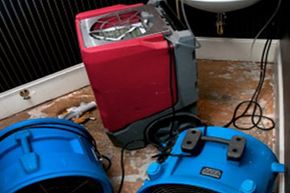Key Takeaways
- Dehumidifiers remove excess moisture from the air, preventing mold, mildew and damage to home structures and furniture.
- These devices can mitigate allergy symptoms related to dust mites, fungi and mold by maintaining a drier environment less conducive to these allergens. They can also improve breathing conditions for people with colds or respiratory issues.
- Dehumidifiers are also effective in discouraging pests like roaches and silverfish that thrive in moist conditions.
If you live close to the equator or near a coastal region, you probably hear your local weatherman say the word "humidity" all too often. But no matter where you are, you've surely experienced it -- that muggy, heavy feeling that fills the air, often when it's rainy, foggy or hot outside. It can make your hair frizzy and may seem to dampen everything, including your mood.
When people complain about humidity, for the most part they're talking about relative humidity. Depending on temperature, air can hold a fixed amount of water vapor; relative humidity is the ratio of actual vapor in the air to this fixed amount. For example, at a temperature of 68 degrees Fahrenheit (20 degrees Celsius), one cubic meter (35 cubic feet) of air can hold about 18 grams (.6 ounces) of water. This would be a state of saturation, otherwise known as 100 percent relative humidity.
Advertisement
That's a lot of jargon to describe a level of humidity that, for many people, can feel extremely uncomfortable. When this humidity seeps into your home, it can make rooms feel stuffy and perhaps even smell musty. Beyond these superficial discomforts, too much humidity can have some more serious disadvantages, too. An overly humid home can lose its structural integrity, attract pests like silverfish and centipedes, and even make you sick.
In an average home in which the temperature is 68 degrees Fahrenheit, the relative humidity should ideally be between 30 and 50 percent. If you're struggling to reach that range, a dehumidifier may come in handy. Dehumidifiers remove excess moisture from the air, improving the comfort and health of your home.
In this article, you'll learn what types of dehumidifiers are available and how you can get the best results out of the dehumidifier you have. But first, read on to next page to find out exactly how a dehumidifier does its job.
Advertisement

